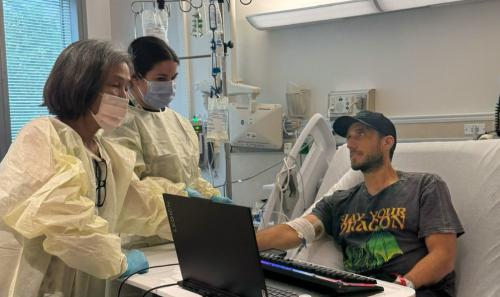
-
Understanding primary immunodeficiency (PI)

Understanding PI
The more you understand about primary immunodeficiency (PI), the better you can live with the disease or support others in your life with PI. Learn more about PI, including the various diagnoses and treatment options.
-
Living with PI
-
Addressing mental health
-
Explaining your diagnosis
- General care
- Get support
- For parents and guardians
-
Managing workplace issues
- Navigating insurance
-
Traveling safely

Living with PI
Living with primary immunodeficiency (PI) can be challenging, but you’re not alone—many people with PI lead full and active lives. With the right support and resources, you can, too.
-
Addressing mental health
-
Get involved

Get involved
Be a hero for those with PI. Change lives by promoting primary immunodeficiency (PI) awareness and taking action in your community through advocacy, donating, volunteering, or fundraising.
-
Advancing research and clinical care
-
Research Grant Program
-
Consulting immunologist
-
Diagnosing PI
-
Getting prior authorization
-
Clinician education
-
Survey research
-
Participating in clinical trials

Advancing research and clinical care
Whether you’re a clinician, researcher, or an individual with primary immunodeficiency (PI), IDF has resources to help you advance the field. Get details on surveys, grants, and clinical trials.
-
Research Grant Program

In early July, surgeons placed a central line in 9-year-old Jax Ramirez’s neck in preparation for gene therapy. Jax was tired and sore when he woke up, but he did well, said his mother, Missy Ramirez. The next day doctors extracted his blood through his central line and used a machine to separate the cells that will be modified and returned the remaining blood to his body. It wiped him out, said his mom. Fortunately, they collected enough stem cells to modify and transplant back into Jax next month.
“It was simply incredible to watch his little bag of cells get put in a cooler and get walked down that hallway. All I kept thinking was, ‘His future is in that box’,’” she said.
Jax has a very rare primary immunodeficiency called immune dysregulation, polyendocrinopathy, enteropathy X-linked (IPEX) syndrome. Because it is an X-linked condition, IPEX affects primarily boys and causes severe autoimmunity, an overreaction of the immune system where the body attacks itself. The autoimmunity can target any organ, including the gut, skin, and endocrine organs—particularly the pancreas and thyroid gland. IPEX also leaves patients vulnerable to frequent and severe infection. The condition is life-threatening, and patients rarely live past age 30 without treatment.
Though a bone marrow transplant is an accepted treatment for IPEX, Jax couldn’t find a matching stem cell donor. His parents chose to enroll him in an IPEX gene therapy clinical trial conducted by researchers at Stanford University. The youngest trial participant, Jax is scheduled to receive the transfusion of his modified cells in August.
“We’re just taking it one day at a time,” said Ramirez, who temporarily relocated her family of four from Pittsburgh, Pennsylvania to San Jose, California while Jax is undergoing the procedure.
IPEX has affected Jax a little differently than most other IPEX patients. Instead of getting sick in infancy, like most boys with IPEX, he first showed symptoms at age 2 when he developed shaking and rapid breathing. Within 24 hours, he lay in a pediatric intensive care unit (PICU) almost in a coma and fighting for his life. Doctors diagnosed him with type 1 diabetes.

"It was just a whirlwind and a nightmare,” said Ramirez, who added that she and her husband, Pete, spent 17 days in the hospital with Jax, learning how to care for him, while also tending to their newborn, Lincoln. “That moment I think about all the time because we had no family history of type 1 diabetes, and I just knew something wasn't right.”
When he was 3 years old, Jax contracted hand, foot, and mouth disease. Typically a mild illness that causes a rash, the disease in Jax led to staph scalded skin syndrome. His skin sloughed off, making him appear as though he’d been burned. As with the type 1 diabetes diagnosis, doctors had no explanation for his reaction.
At 4, Jax required hospitalization from an infection caused by the herpes simplex virus (HSV). Blisters covered his face, a swollen tongue prevented him from swallowing, and his fever raged. It even infected his eyes.

“None of this seemed normal to me,” said Ramirez. “I would always describe him to doctors as a boulder sitting at the top of the hill and one little movement and he’s coming down, and we have to act swiftly.”
The health issues only mounted. Doctors were forced to intubate Jax when he got the flu, leading to a month-long recovery in the hospital. A month later, a severe drop in iron prevented him from walking. At that point, doctors noticed he had low or no titers to vaccines, including the flu vaccine, but none ordered further testing.
In the fall of 2020 when Jax was 5, health providers urged Ramirez to get the flu shot for her son. She didn’t want to because of past bad reactions to immunizations but she relented. Within three weeks he had double vision. Doctors gave Jax an eye patch and a prescription for heavy steroids.
Additional bloodwork showed that he had developed myasthenia gravis—an autoimmune disorder that affects voluntary muscles, including those in the eyes. Doctors prescribed low-level immunosuppressants and intravenous immunoglobulin (IVIG) replacement therapy—and recommended a genetic panel. They took the blood for the panel in spring 2021 and got results in fall 2021. Doctors insisted on sharing the results over video conference, not on the phone.

“The doctors were crying when I got on. I asked, ‘Why are you crying?’ And she said, ‘Jax defied all odds. He came back positive for IPEX.’ And I was like, ‘Well, what does that mean?’ And she said, ‘Well, it means that it is life-threatening and the only known cure is a blood stem cell transplant, but we ran the registry, and he doesn’t have any matches.’ It was the worst day of my life,” said Ramirez.
Ramirez said she believed that because she had kept her son in isolation for so long, he hadn’t succumbed to his illnesses. Isolation, and being separated from family and friends, wasn’t easy—and neither were the years of not knowing why her son suffered so much.
“Our geneticist said that every doctor who had seen Jax since he was two-and-a-half owed me an apology because I was right—it wasn’t bad luck. She said she felt like nobody listened to me,” said Ramirez.
Because Jax is Russian, French, Hispanic, Black, and Brazilian, his human leukocyte antigen (HLA) type, proteins found on most of the cells in the body, is incredibly unique, making finding a donor extremely difficult, said Ramirez. She quickly got to work organizing Be the Match for Jax, a grassroots organization that planned events during which people ages 18 to 40 swabbed their cheeks to see if they were matched to be bone marrow donors for Jax.
Ramirez said even if they weren’t matches for Jax, they could be matches for other people. She estimates that she’s organized over 275 events that enrolled over 7,000 people in the bone marrow donation registry.
Jax had three matches, but all declined to donate, which led his parents to explore the remaining treatment option, gene therapy. Jax had already contributed blood to the Stanford IPEX clinical trial and conversations with researchers encouraged the family. But transportation was an obstacle. They didn’t want their son flying on a commercial airplane because of the infection risk.
A year later, a local business owner who learned about Jax offered the family an unexpected option—he’d fly them free of charge to California on his private jet. The family gratefully accepted.
“I thought, ‘This could change the trajectory of Jax’s life,’” said his mom.

The family arrived in San Jose, California in June and have settled in. With Jax and Lincoln being both brothers and best friends, they try to do some of the fun activities they used to do back home in Pittsburgh like play video games, hike with their parents, and visit the beach when Jax is feeling well enough.
Ramirez said she and her husband are at peace with their decision to have Jax receive gene therapy and that she doesn’t expend energy pondering why IPEX has impacted their lives.
“I always say my answer lies ahead of me, not behind me,” she said.
Walk for PI
The IDF Walk for Primary Immunodeficiency (PI) is an opportunity for communities across the U.S. to raise both funds and awareness for PI. At each event, you can form a team, join a team, register as an individual walker, or make a contribution.
Sign up to walkRelated resources

Man with X-linked hyper IgM first-ever to receive novel gene therapy

FDA approves first gene therapy for Wiskott-Aldrich syndrome

How FOXP3 changed immunology: Tregs, IPEX, and the Nobel Prize explained
Sign up for updates from IDF
Receive news and helpful resources to your cell phone or inbox. You can change or cancel your subscription at any time.





The Immune Deficiency Foundation improves the diagnosis, treatment, and quality of life for every person affected by primary immunodeficiency.
We foster a community that is connected, engaged, and empowered through advocacy, education, and research.
Combined Charity Campaign | CFC# 66309

